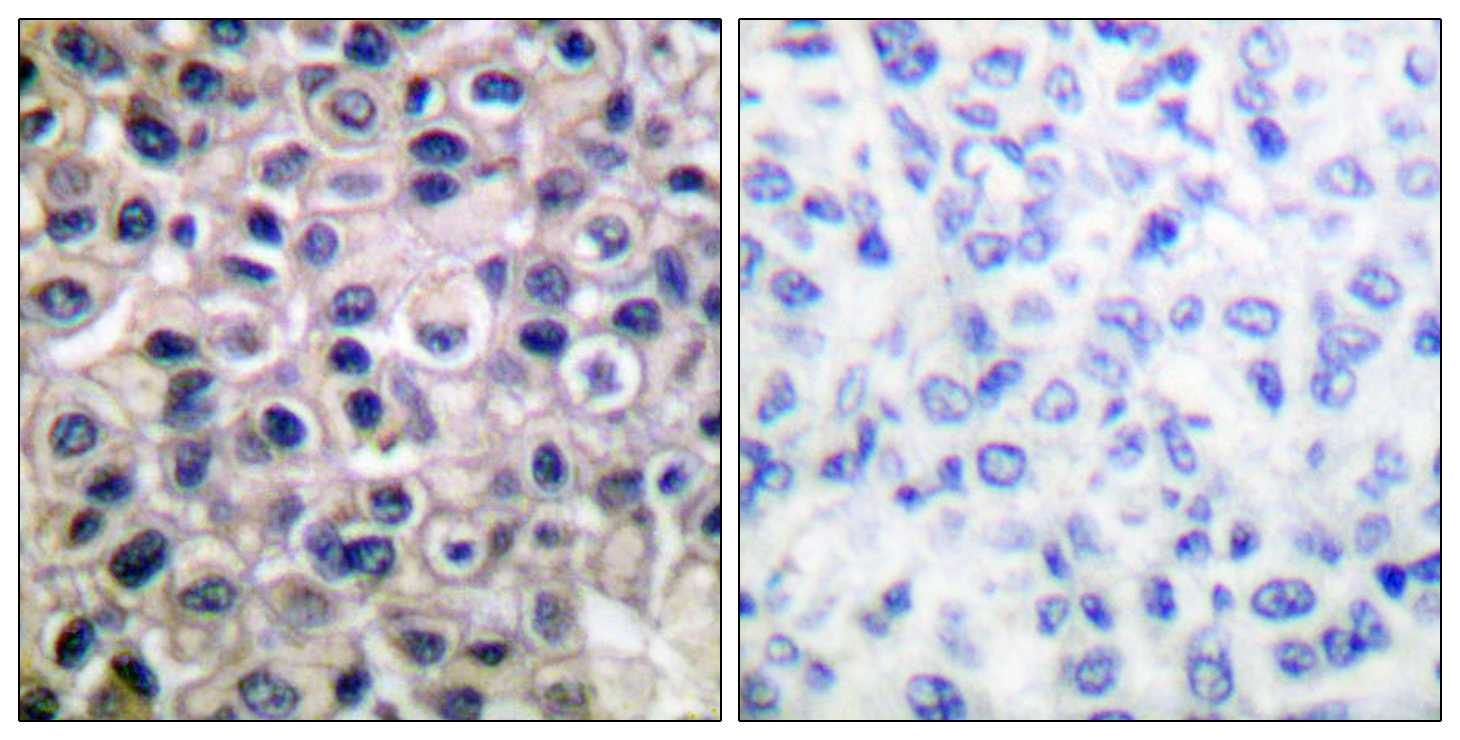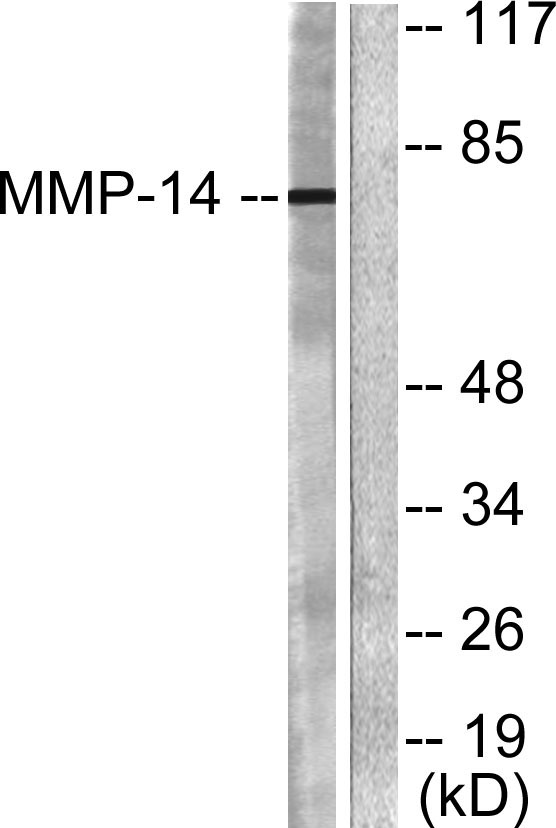MMP-14 Polyclonal Antibody
- Catalog No.:YT2910
- Applications:WB;IHC;IF;ELISA
- Reactivity:Human;Mouse;Rat
- Target:
- MMP-14
- Fields:
- >>TNF signaling pathway;>>GnRH signaling pathway;>>Parathyroid hormone synthesis, secretion and action
- Gene Name:
- MMP14
- Protein Name:
- Matrix metalloproteinase-14
- Human Gene Id:
- 4323
- Human Swiss Prot No:
- P50281
- Mouse Gene Id:
- 17387
- Mouse Swiss Prot No:
- P53690
- Rat Gene Id:
- 81707
- Rat Swiss Prot No:
- Q10739
- Immunogen:
- The antiserum was produced against synthesized peptide derived from human MMP-14. AA range:471-520
- Specificity:
- MMP-14 Polyclonal Antibody detects endogenous levels of MMP-14 protein.
- Formulation:
- Liquid in PBS containing 50% glycerol, 0.5% BSA and 0.02% sodium azide.
- Source:
- Polyclonal, Rabbit,IgG
- Dilution:
- WB 1:500 - 1:2000. IHC 1:100 - 1:300. ELISA: 1:10000.. IF 1:50-200
- Purification:
- The antibody was affinity-purified from rabbit antiserum by affinity-chromatography using epitope-specific immunogen.
- Concentration:
- 1 mg/ml
- Storage Stability:
- -15°C to -25°C/1 year(Do not lower than -25°C)
- Other Name:
- MMP14;Matrix metalloproteinase-14;MMP-14;MMP-X1;Membrane-type matrix metalloproteinase 1;MT-MMP 1;MTMMP1;Membrane-type-1 matrix metalloproteinase;MT1-MMP;MT1MMP
- Observed Band(KD):
- 65kD
- Background:
- Proteins of the matrix metalloproteinase (MMP) family are involved in the breakdown of extracellular matrix in normal physiological processes, such as embryonic development, reproduction, and tissue remodeling, as well as in disease processes, such as arthritis and metastasis. Most MMP's are secreted as inactive proproteins which are activated when cleaved by extracellular proteinases. However, the protein encoded by this gene is a member of the membrane-type MMP (MT-MMP) subfamily; each member of this subfamily contains a potential transmembrane domain suggesting that these proteins are expressed at the cell surface rather than secreted. This protein activates MMP2 protein, and this activity may be involved in tumor invasion. [provided by RefSeq, Jul 2008],
- Function:
- catalytic activity:Endopeptidase activity. Activates progelatinase A by cleavage of the propeptide at 37-Asn-|-Leu-38. Other bonds hydrolyzed include 35-Gly-|-Ile-36 in the propeptide of collagenase 3, and 341-Asn-|-Phe-342, 441-Asp-|-Leu-442 and 354-Gln-|-Thr-355 in the aggrecan interglobular domain.,cofactor:Binds 1 zinc ion per subunit.,cofactor:Calcium.,domain:The conserved cysteine present in the cysteine-switch motif binds the catalytic zinc ion, thus inhibiting the enzyme. The dissociation of the cysteine from the zinc ion upon the activation-peptide release activates the enzyme.,function:Seems to specifically activate progelatinase A. May thus trigger invasion by tumor cells by activating progelatinase A on the tumor cell surface.,PTM:The precursor is cleaved by a furin endopeptidase.,similarity:Belongs to the peptidase M10A family.,similarity:Contains 4 hemopexin-like domains.,s
- Subcellular Location:
- Membrane ; Single-pass type I membrane protein . Melanosome. Cytoplasm. Identified by mass spectrometry in melanosome fractions from stage I to stage IV. Forms a complex with BST2 and localizes to the cytoplasm.
- Expression:
- Expressed in stromal cells of colon, breast, and head and neck. Expressed in lung tumors.
LncRNA UCA1 promotes migration and invasion in pancreatic cancer cells via the Hippo pathway. BIOCHIMICA ET BIOPHYSICA ACTA-MOLECULAR BASIS OF DISEASE 2018 Mar 03 WB Human BxPC-3 cell, SW1990 cell,PaTu8988 cell, PANC-1 cell
- June 19-2018
- WESTERN IMMUNOBLOTTING PROTOCOL
- June 19-2018
- IMMUNOHISTOCHEMISTRY-PARAFFIN PROTOCOL
- June 19-2018
- IMMUNOFLUORESCENCE PROTOCOL
- September 08-2020
- FLOW-CYTOMEYRT-PROTOCOL
- May 20-2022
- Cell-Based ELISA│解您多样本WB检测之困扰
- July 13-2018
- CELL-BASED-ELISA-PROTOCOL-FOR-ACETYL-PROTEIN
- July 13-2018
- CELL-BASED-ELISA-PROTOCOL-FOR-PHOSPHO-PROTEIN
- July 13-2018
- Antibody-FAQs
- Products Images

- Immunohistochemistry analysis of paraffin-embedded human breast carcinoma tissue, using MMP-14 Antibody. The picture on the right is blocked with the synthesized peptide.

- Western blot analysis of lysates from NIH/3T3 cells, using MMP-14 Antibody. The lane on the right is blocked with the synthesized peptide.



